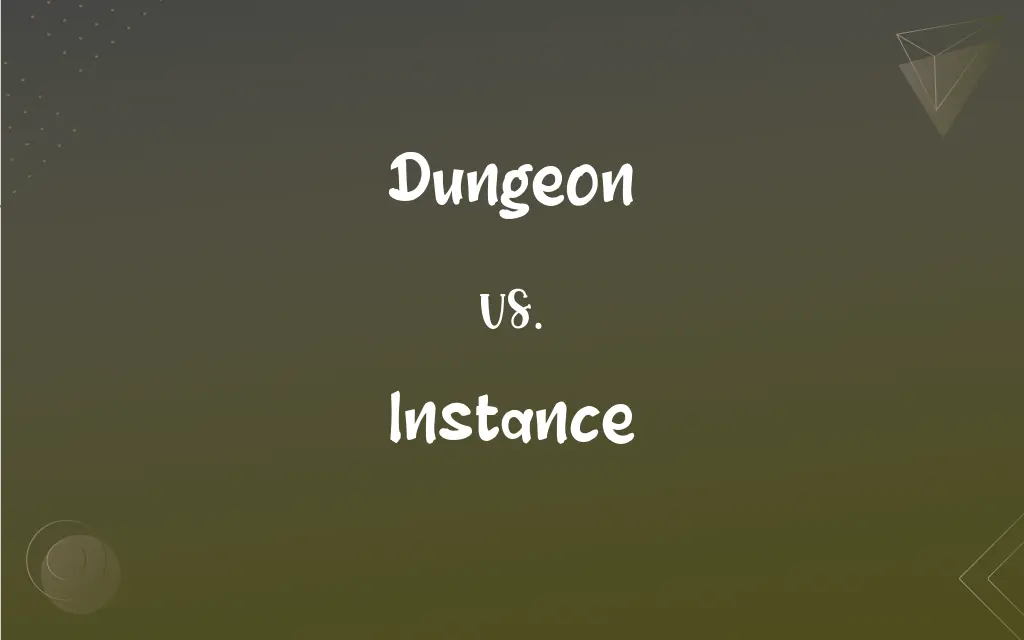Dungeon vs. Instance: What's the Difference?
By Harlon Moss & Aimie Carlson || Updated on May 22, 2024
A dungeon is a large, enclosed area in video games with multiple enemies and challenges, while an instance is a copy of a game area created for individual players or groups, ensuring unique and private gameplay experiences.

Key Differences
A dungeon is a staple in many video games, particularly in the RPG genre, where it represents a large, enclosed area filled with enemies, puzzles, and treasure. These are often designed for group play and are persistent areas in the game world. An instance, on the other hand, is a unique copy of a game area generated for individual players or groups. Instances ensure that the gameplay experience is private and unaltered by other players' actions. While dungeons are often static and shared, instances provide a personalized and controlled environment.
Dungeons are typically persistent areas that all players can access and interact with, making them integral parts of the game world. Conversely, instances are temporary and exclusive to the group that created them, offering a tailored challenge and preventing interference from other players.
In dungeons, the challenges and enemies remain the same for all players, adding to the shared experience. Instances adjust to the group's progress and can scale in difficulty, offering a customized adventure.
Dungeons often feature a continuous story or quest line that multiple players can undertake simultaneously. Instances allow for a more flexible and dynamic storytelling approach, adapting to the specific group and their actions.
Both dungeons and instances provide rich, immersive experiences but cater to different gameplay styles. Dungeons emphasize community and shared challenges, while instances focus on individualized and controlled gameplay.
ADVERTISEMENT
Comparison Chart
Definition
Large, enclosed game area with challenges
Private, copy of a game area for players
Persistence
Persistent, accessible to all players
Temporary, unique to the group
Interference
Shared experience with other players
No interference from other players
Story/Quest
Continuous, shared storylines
Flexible, dynamic storytelling
Customization
Static challenges and enemies
Scales to group progress and difficulty
ADVERTISEMENT
Dungeon and Instance Definitions
Dungeon
Persistent area accessible to all players.
Players from all over the world can explore the dungeon together.
Instance
Prevents interference from other players.
Their adventure in the instance was uninterrupted by others.
Dungeon
Features static challenges and puzzles.
Every time they entered the dungeon, they faced the same traps.
Instance
An example that is cited to prove or invalidate a contention or illustrate a point.
Dungeon
Designed for group play and cooperative challenges.
The dungeon raid required a team of experienced players.
Instance
A case or an occurrence
In all such instances, let conscience be your guide.
Dungeon
Integral part of the game world with continuous storylines.
The dungeon's lore was tied to the main quest.
Instance
A step in a process or series of events
You should apply in the first instance to the personnel manager.
Dungeon
Large, enclosed game area with multiple enemies.
The dragon's dungeon was filled with treasures and traps.
Instance
A suggestion or request
Called at the instance of his attorney.
Dungeon
A dark, often underground chamber used to confine prisoners.
Instance
(Archaic) Urgent solicitation or entreaty.
Dungeon
A donjon.
Instance
To offer as an example; cite
"I assured her that I was interested in garbage, and instanced the fact that I had once been a garbage inspector myself" (Jane Addams).
Dungeon
An underground prison or vault, typically built underneath a castle.
Instance
To demonstrate or show by an example; exemplify
"how absurd it often is to cite a single line from ... a poem for the purpose of instancing the perfection or imperfection of the line's rhythm" (Edgar Allan Poe).
Dungeon
(obsolete) The main tower of a motte or castle; a keep or donjon.
Instance
(obsolete) Urgency of manner or words; an urgent request; insistence.
Dungeon
(obsolete) A shrewd person.
Instance
(obsolete) A token; a sign; a symptom or indication.
Dungeon
(games) An area inhabited by enemies, containing story objectives, treasure and bosses.
Instance
(obsolete) That which is urgent; motive.
Dungeon
(BDSM) A room dedicated to sadomasochistic sexual activity.
Instance
(obsolete) A piece of evidence; a proof or sign (of something).
Dungeon
(transitive) To imprison in a dungeon.
Instance
Occasion; order of occurrence.
Dungeon
A close, dark prison, commonly, under ground, as if the lower apartments of the donjon or keep of a castle, these being used as prisons.
Down with him even into the deep dungeon.
Year after year he lay patiently in a dungeon.
Instance
A case offered as an exemplification or a precedent; an illustrative example.
Dungeon
To shut up in a dungeon.
Instance
One of a series of recurring occasions, cases, essentially the same.
Dungeon
The main tower within the walls of a medieval castle or fortress
Instance
(computing) A specific occurrence of something that is created or instantiated, such as a database, or an object of a class in object-oriented programming.
Dungeon
A dark cell (usually underground) where prisoners can be confined
Instance
(massively multiplayer online games) A dungeon or other area that is duplicated for each player, or each party of players, that enters it, so that each player or party has a private copy of the area, isolated from other players.
Instance
(massively multiplayer online games) An individual copy of such a dungeon or other area.
Instance
(Internet) An independent server on the decentralised social networking platform Mastodon.
Instance
(transitive) To mention as a case or example; to refer to; to cite
Instance
(intransitive) To cite an example as proof; to exemplify.
Instance
The act or quality of being instant or pressing; urgency; solicitation; application; suggestion; motion.
Undertook at her instance to restore them.
Instance
That which is instant or urgent; motive.
The instances that second marriage moveAre base respects of thrift, but none of love.
Instance
Occasion; order of occurrence.
These seem as if, in the time of Edward I., they were drawn up into the form of a law, in the first instance.
Instance
That which offers itself or is offered as an illustrative case; something cited in proof or exemplification; a case occurring; an example; as, we could find no instance of poisoning in the town within the past year.
Most remarkable instances of suffering.
Instance
A token; a sign; a symptom or indication.
Instance
To mention as a case or example; to refer to; to cite; as, to instance a fact.
I shall not instance an abstruse author.
Instance
To give an example.
This story doth not only instance in kingdoms, but in families too.
Instance
An occurrence of something;
It was a case of bad judgment
Another instance occurred yesterday
But there is always the famous example of the Smiths
Instance
An item of information that is representative of a type;
This patient provides a typical example of the syndrome
There is an example on page 10
Instance
Clarify by giving an example of
Instance
Unique copy of a game area for players or groups.
Each party had their own instance of the dungeon.
Instance
Temporary and exclusive to the creating group.
The instance closed once the group completed the quest.
Instance
Offers a tailored and controlled gameplay experience.
The instance scaled in difficulty to match their level.
Instance
Adapts to the group's progress and actions.
The instance's boss became harder as they progressed.
FAQs
What is a dungeon in gaming?
A dungeon is a large, enclosed area filled with enemies, puzzles, and treasure, designed for group play in video games.
Are dungeons and instances the same?
No, dungeons are persistent and shared areas, while instances are private and temporary copies for individual groups.
Can you play a dungeon solo?
Some dungeons can be played solo, but many are designed for group play due to their difficulty and complexity.
Do instances prevent other players from interfering?
Yes, instances are exclusive to the creating group, preventing interference from other players.
What does instance mean in a game context?
An instance is a unique copy of a game area created for a specific group of players, ensuring a private and tailored gameplay experience.
What is the main advantage of instances?
Instances offer a personalized and interference-free gameplay experience.
Do dungeons have dynamic storytelling?
Dungeons typically have continuous and shared storylines, whereas instances can offer more dynamic storytelling.
How do dungeons contribute to the game world?
Dungeons often feature continuous storylines and lore that are integral to the overall game world.
Why are instances used in games?
Instances provide a controlled environment for players, offering a unique and uninterrupted gameplay experience.
Do dungeons offer the same challenges every time?
Typically, yes. Dungeons have static challenges and puzzles that remain consistent.
Are dungeons a part of the main game world?
Yes, dungeons are persistent parts of the game world accessible to all players.
Can instances be repeated with the same group?
Yes, groups can create new instances to replay content.
How are instances created?
Instances are generated when a group or player enters a specific area or starts a quest.
Are dungeons more community-focused than instances?
Yes, dungeons emphasize community and shared experiences, while instances focus on individual or group privacy.
What is the main benefit of dungeons in multiplayer games?
Dungeons foster community and cooperative gameplay by allowing multiple players to tackle challenges together.
What happens to an instance after completion?
Instances are usually closed or reset after the group completes their objective.
Can the difficulty of an instance change?
Yes, instances can scale in difficulty based on the group's progress and actions.
Can instances be accessed by multiple groups simultaneously?
No, instances are unique to each group, preventing simultaneous access by multiple groups.
How do dungeons handle player progress?
Dungeons do not usually adapt to player progress; the challenges remain static.
Do instances offer a consistent experience every time?
Instances can vary in experience as they adapt to the group's progress, whereas dungeons remain consistent.
About Author
Written by
Harlon MossHarlon is a seasoned quality moderator and accomplished content writer for Difference Wiki. An alumnus of the prestigious University of California, he earned his degree in Computer Science. Leveraging his academic background, Harlon brings a meticulous and informed perspective to his work, ensuring content accuracy and excellence.
Co-written by
Aimie CarlsonAimie Carlson, holding a master's degree in English literature, is a fervent English language enthusiast. She lends her writing talents to Difference Wiki, a prominent website that specializes in comparisons, offering readers insightful analyses that both captivate and inform.































































